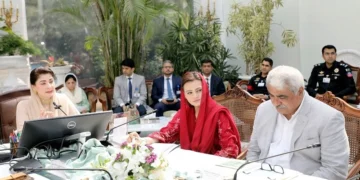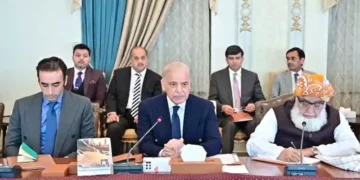KARACHI- “Industry – Institutions linkages and effective engagement of employers in the design and delivery of TVET is important for developing a workforce with right skills”. This is said by Ismail Suttar, President, EFP while addressing a Stakeholders’ Consultation on Industry – Institution Linkages – Challenge and Opportunities organized by Skill Development Council Karachi jointly with Employers’ Federation of Pakistan (EFP) and Federation of Pakistan Chamber of Commerce & Industry (FPCCI) supported by GIZ-TVET Sector Support Programme on 7th April, 2021 at Federation House.


Emphasizing the importance of skilled people for industrial development and growth Mr. Suttar pointed out that the skill level of Pakistani workforce is low as compared to the other countries of the region. The ongoing Technical Vocational Training programs are not aligned with the labour market and trainees graduating from the institutions do not possess the skills needed to the local industry which is mainly due to lack of linkages with industry. The low level of skilled people in the country is limiting the capacity of the local industry to innovate and produce good quality products essentially required to remain competitive in the global market besides, opportunities of export and investment.
Mr. Suttar said, the industry needs to be more actively engaged with the institutions and support skills development programs in order to produce workforce with requisite skills as it is in the interest of industry. The Government departments dealing with TVET should create supportive environment and institutional framework for industry to contribute in the development of TVET system geared to cater the current and foreseeable future skilled need of industry for making Pakistan industrialized and prosperous country.
He stressed upon the need to explore new sector and said the Mineral Sector in Pakistan has a huge potential of employment and growth. The sector with little attention and focus on processing and value addition of minerals can immensely contribute in creating employment and fetching millions of dollars to export. He particularly mentioned that the Mines & Minerals sector can immensely help in increasing the export provided focus is made on processing and value addition of minerals available in Pakistan.
Hanif Lakhany, Vice President, Federation of Pakistan Chamber of Commerce & Industry said stable and market based Technical Vocational Education and Training is crucial for sustainable economic development and employment generation. He added that the availability of skilled workforce lead to national self-reliance and enhances the industrialization process besides brining innovation and productivity enhancement.
He further said that FPCCI is fully committed to play its role in improving the quality of skills development programs by promoting Industry – Institution Linkages and establishing sustainable training partnerships. The Federation is also working with TVET Sector Support Programme and supporting Reform Process aimed at improving the quality and relevance of training programs.
Zaki Ahmed Khan, Vice President, Employers’ Federation of Pakistan said the Technical Vocational Training is a shared responsibility and the employers as a key stakeholder and beneficiary of skilled workforce have an important role in shaping TVET as per needs of labour market. The Employers’ Federation of Pakistan fully recognized the importance of skills development programs and already engaged in the policy making and promoting skills development programs at the enterprise level.
He pointed out that the TVET institutions in the past has made a significant contribution in producing skilled people to meet the skills need of growing industrial sector. However, with the passage of time the public sector failed to keep pace with the technology used in the industry and producing workforce as per emerging needs of industry.
Mr. Zaki said, the Apprenticeship Programme which has globally been recognized as most effective system of developing skilled workforce for the industry and was used by the local industry for training of their workforce has also lost its utility due to lack of focus and attention of policy makers. There is an immediate need for amendment making Apprenticeship Programme industry friendly with incentive to industry. He informed that participants that the EFP recognizing its due role and responsibility has prepared EFP Skills Initiative – 2025 aimed at supporting and improving the quality of TVET system. The initiatives include extending support and developing linkages with a public sector TVET programs and promoting Apprenticeship and in-plant training within the enterprises.
Syed Nazar Ali, CEO, Skill Development Council Karachi in his presentation highlighted the importance and benefits of partnership between Industry and Institutions, current status of industry – institution linkages, issues and constraints in establishing and promoting sustainable partnership including rigidity of system, non-engagement of employers in the planning of various training programs offered by the Federal and Provincial Governments and shyness of public sector in sharing powers with private sector. He also suggested the possible area of contribution and the responsibilities of industry and the institutions in promoting the partnership in a way that is beneficial for both and create win-win situation.
He also emphasized the importance of industry led institutions and stressed upon the need to support employer led institutions by giving them mandate and proper role in promoting skills development programs. He particularly mentioned Institute Management Committees and Skill Development Councils being employer led are in a better position to promote quality skills development ensuring active and effective engagement of industry.
Fasih ul Karim Siddiqui, Advisor, EFP said the Public Sector TVET System has failed to meet the skills needs of local industry due to its inefficiency, misgovernance and misconnect and disconnect with the need of industry. He stressed that the Technical Vocational Training should be industry driven with prominent and effective role of employers in designing and delivery of training and proposed that the institutions should be managed by the employer’s organizations in order to provide training to the youth as per need of the industry and skills upgrading of the workers to adjust with the emerging and changing needs.
He further said the only solution to meet the challenges faced to the economy of Pakistan is complete revamping of Technical Vocational Training System making it industry driven with prominent role and ownership to employers and Government should act as a facilitator. He added that the vocational training without engagement of industry can never be demand driven and meet the need of local industry. He demanded that apprenticeship ordinance 1962 should be replaced by new apprenticeship law based upon the recommendation of the employers submitted a decade ago and which is laying MOPHRD.
Yousuf Baloch, Director IC, Sindh TEVTA talked about the strategies and initiative taken by Sindh TEVTA to promote Industry – Institution Linkages and Public Private Partnership for sustainable linkages between industry and institutions. He also discussed the ongoing reforms in TVET Sector for improving its quality and relevance including strengthening of employers led Institute Management Committees at the institutional level by giving more role and mandate.
He requested the EFP, FPCCI and other employers’ bodies for their support in nominating technical people for the Institute Management Committees being constituted at the institutional level to improve the governance and quality of training in the institutions.
Muhammad Irfan, Former President, Federal B. Area Association of Trade & Industry and Qadir Bilwani, Vice President, SITE Association of Industry also shared their views and experience of working with TVET Institutions. They pointed out that the IMCs established at the institutions to strengthen the training activities have not been provided the mandate and role needed to bring the changes in the institutions. They stressed upon the need for immediate action and support for empowering and improving the functioning of Institute Management Committees.
Dr. Shahid Qureshi, Programme Director, AMAN Centre for Entrepreneurial Development, IBA talked about need of entrepreneurship training and producing more entrepreneurs to convert job seekers into a job provider.
The meeting was largely attended by the representative of enterprises, employer’s bodies, training institutions, both public & private sector, STEVTA and Government Officers.



















